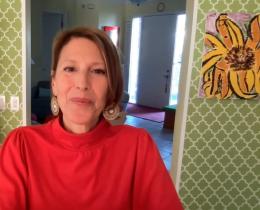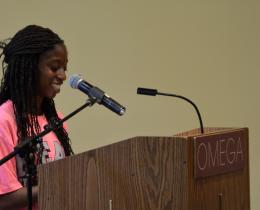On opening night of my first professional show, I stood backstage at the Circle in the Square Theatre on Broadway and peered out from the wings at the gathering crowd. I was very young and very frightened. As the house lights dimmed, I felt a hand on my shoulder. “Are you scared, kid?” I looked up into Eli Wallach’s eyes. I nodded. “Terrified.”
“Don’t be,” he said. “You’ve done your work. Now just relax and stay out of your own way.”
“Just relax.” It seemed so simple and yet impossible at the time—if stage fright didn’t get to me, all my notions about “gearing up” for a performance surely would. Wasn’t I supposed to be running on nerves? Isn’t that what made a performance “electric”? The stage lights came up and Mr. Wallach, with a deep breath and a fatherly wink, sailed on-stage.
Over the years I have come to regard that exchange as one of the most profound lessons in creativity—and life—I’ve ever had. Relax and stay out of your own way. But how? We all know that the path to creativity is lined with obstacles (think of all those stories about the oyster needing a grain of sand to create a pearl). But what if it were possible to meet those obstacles not with resistance and strain but with curiosity?
When I began graduate studies in creative writing at NYU, after years of performing on and off-Broadway, my old stage fright translated into anxiety whenever I faced the dreaded blank page. I longed to be able to drop into my characters’ thoughts and lives as easily as I inhabited a role on stage. Often I would light a candle before sitting down to write, hoping to still myself enough to let my inner voice be heard. “Just relax and stay out of your own way.” Easy to say. But it wasn’t always so easy to do. Mostly it was hit-or-miss; the muse was with me or not. I had no way to find her on my own.
As an actress I had studied deep breathing techniques, yoga, qigong, and meditation as ways to bypass my fight-or-flight impulse before an audition and stay open to my instincts in the moment. When I combined this with “sense memory” (one of the foundations of Method acting which teaches you to concentrate on a sensory experience for emotional recall), my focus and awareness seemed to increase; by giving my very active conscious mind something specific to do, my unconscious and creative impulses were let out to play. It made sense that these techniques should apply to my writing.
I began to approach my creative life as a spiritual practice, a meditative discipline that could expand my awareness and bring me closer to my inner voice. It worked. When I created a safe and open space within, my “muse” appeared to fill it. Like the magical child the imagination is, all it asked for was to be welcomed home.
These days, when I teach my Relax & Write workshops, I am always amazed at how few of us are trained to slow down and listen when we sit down to write. Our minds are so filled with what we “should” write, what we think we want to write, or the fear that we haven’t got anything at all to write, that we forget to check in with the only place that matters—our inner selves. This is where our stories live and where our true voice can be heard. There’s a feeling that accessing this inner material is something miraculous, that it happens by chance or luck. This belief is as strongly held by seasoned writers as it is by novices. But it’s not true. Every one of us has lived great stories and has a voice to tell them with—the only thing some of us are lacking, as the Wizard said to Dorothy, is the means of transportation.
The Relax & Writeprocess is a kind of hot-air balloon to creative Oz. It’s nearly as simple as clicking ruby slippers together: relax, follow the journey, travel to your own unconscious. Does it happen the first time out? More often than not, yes, and with practice it is as reliable as Auntie Em.



